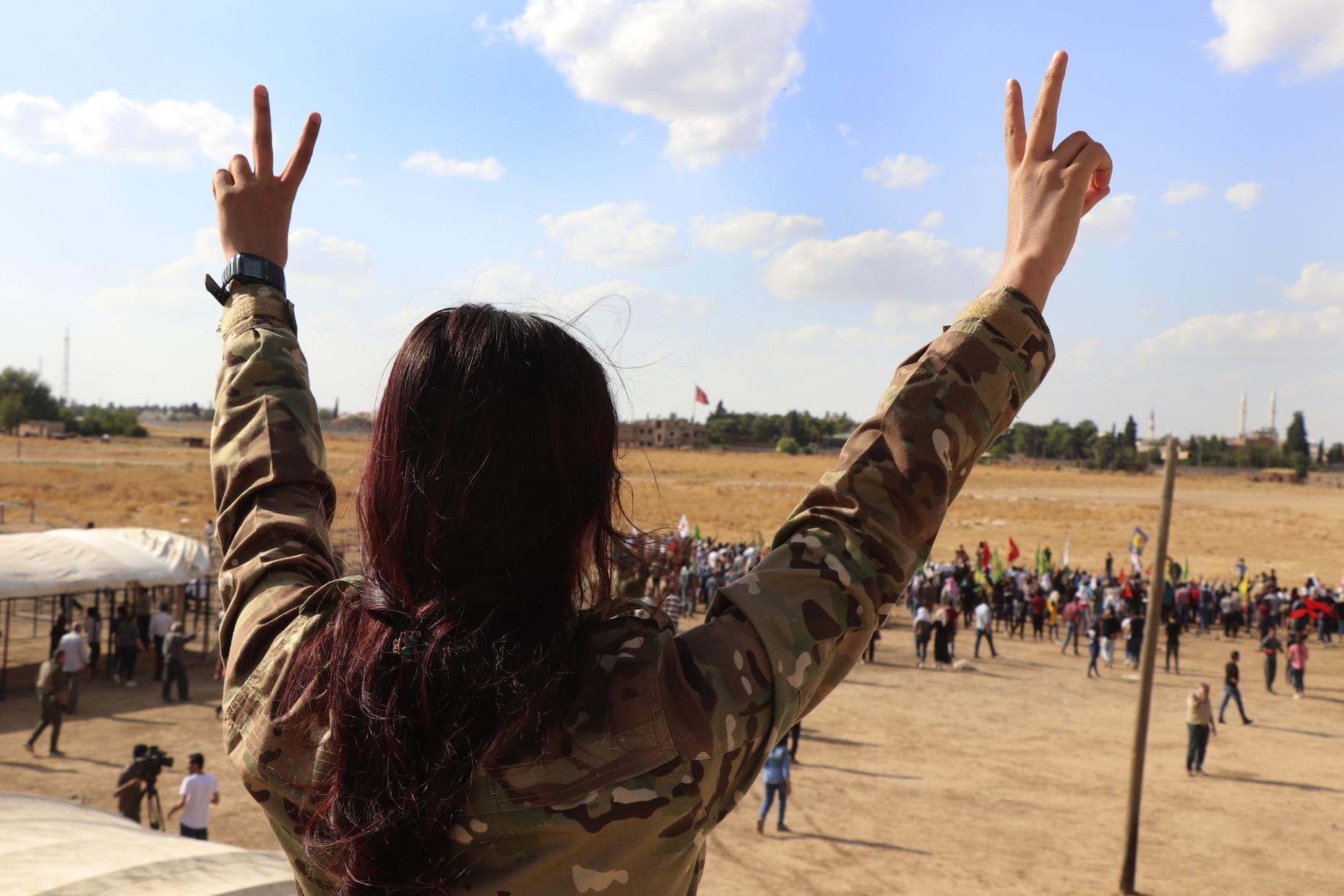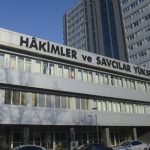There’s no one size fits all feminism.
Betty Friedan, Gloria Steinem, Naomi Klein, and Tarana Burke, who started the #MeToo movement back in 2006, et al. have done a condemnable job analyzing and criticizing the effects the remains of Western patriarchal society have on women not having equal participation and more importantly access to, opportunities men take for granted. Even Simone de Beauvoir, credited with paving the way for modern feminism, book “The Second Sex” (1949) was finger-pointing without offering solutions. Western feminism has never had a solid mandate and therefore continues to be rudderless.
Then there’s Kurdish feminism which I first encountered when I met Halime Aktürk, a former Turkish journalist. I know several self-proclaiming “feminists.” However, I’ve never known, nor do I believe I ever will, a self-identifying feminist who has the conviction Halime has. Halime knows her terms and projects a strong sense of “self,” which earned my utmost respect.
My truth: Most of my ‘life guidance’ and ‘life lessons’ have been from women. This is likely why I have a romantic view of the human condition.
Having read western feminists’ writings, and Norman Mailer for the “other side” perspective, I know feminist activists have clarified many questions for women. However, as Halime pointed out to me, simply asking questions isn’t enough for Kurdish women—they’re in a crisis.
The Ottoman Empire collapse created a crisis for Kurdish women.
History, like all stories handed down, is a complicated bargain.
The crises Kurdish women are experiencing today began with the collapse of the Ottoman Empire in 1922. The downfall divided the Kurds’ territory among three newly established countries: Iraq, Syria, and Turkey. Since then, each country has been attempting to impose its dominant ethnic identity as the respective country’s “national identity” and, therefore, eliminate any Kurdish identity. This has resulted in a Kurdish narrative that challenges Iraq, Syria and Turkey’s respective assimilation policy of imposing one identity over their territories’ ethnically and culturally different inhabitants.
On July 24, 1923, the Treaty of Lausanne was signed. The treaty led to the international recognition of the sovereignty of the new Republic of Turkey as the successor state of the Ottoman Empire and gave Kurdistan back to Turkey while failing to recognize Kurds existed. That same year some 65 laws aimed at destroying Kurdish identity by renaming them “Mountain Turks,” outlawing the use of the Kurdish language, making Kurdish celebrations illegal, changing Kurdish names of streets, villages, businesses, etc. to “proper Turkish names,” confiscating huge tracts of Kurdish communal lands and eliminating all Kurdish or Kurd-sympathetic organizations or political parties.
Holistically the entire epic of the Kurdish people is their struggle to liberate themselves to create their own society. Kurds, especially those who live in Kurdistan (“Land of the Kurds”), a loosely defined area bordering Iran, Syria and Turkey, carry the hope of one day becoming emancipated slaves.
Today, roughly 32 million Kurds are spread across Armenia, Iran, Iraq, Syria and Turkey. Kurds, caught up in bad faith geopolitics that has oppressed them for generations, constitute the world’s largest stateless nation. Using intersectional lens clarifies that Kurdish women are subjected to a “dual oppression” based on ethnicity and gender; thus, being the ideology architect for Kurdish feminism. Halime’s strong feminist convictions (Only the hard and strong can call themselves a Kurdish feminist.) are the by-product of her experiences being Kurdish in Turkey, where along with Kurdish cultural oppression, patriarchal cultural hands are constantly present to keep women in their place.
Something extraordinary is happening in Rojava.
There’s a revolution in northern Syria, led by Kurdish feminism (aka. Jineology), that challenges everything the West has bought into about economics, government, society, and above all freedom.
The revolution is a fight to experiment with unconditional democracy—to create a way of life that values feminism, direct democracy, ecological stewardship, ethnic, linguistic, and religious pluralism. The structures of oppression, rooted in the state, nationalism, capitalism, cultural conventions, and patriarchy—disguised as “assimilation policies”—are what the “Rojava Revolution,” which began on July 19, 2012, is seeking to surmount.
Rojava, the Kurdish name for western Kurdistan, is an autonomous region in northeastern Syria that has exercised autonomy since the breakout of the Syrian Civil War in 2011. Cradled between the Tigris and Euphrates rivers, Rojava is considered the breadbasket of Syria. It’s a little-known story that defies the usual depictions that find their way to the west regarding Syria or Islamic State in Iraq and Syria (ISIS).
Rojava, home to approximately 2.5 million people, is divided into three districts (Afrin, Jazira, and Kobanî). It’s governed by a coalition of six political parties called the Movement for a Democratic Society (TEV-DEM), headed by the Democratic Union Party (PYD). They practice a governance model called Democratic Confederalism (democracy without a state), a kind of libertarian socialism theorized by imprisoned Kurdistan Workers’ Party (PKK) leader Abdullah Öcalan. This “governance model” began an extraordinary project of self-government and equality for all races, religions, women, and men. This project has led to the Rojava Revolution, which by default challenges domination by Western colonial powers and Syrian president Bashar al-Assad’s regime.
In 2011 the civil uprising in Syria, known as the Arab Spring, escalated into the Syrian Civil War. The Syrian state withdrew from northeastern Syria, and the Kurdish liberation movement saw their window of opportunity. Less than three years later, the Kurdish movement had transformed their revolutionary vision into a revolutionary society by liberating Rojava’s three districts: Cizîre, Kobanî, and Afrîn. In January 2014, the regions united to issue a declaration of democratic autonomy manifesting their unique political ideology, grounded in Öcalan’s writings and ideas.
People fighting to experiment with their own path to all-inclusive democracy makes the Rojava Revolution an interesting Middle East phenomenon—the political character doesn’t fit familiar pigeonholes. The revolution isn’t a nationalist Kurdish initiative for an independent state, doesn’t evangelize socialism, nor is fueled by religious or ethnic motives. Instead, it attempts to establish an autonomous society based on democratic autonomy, environmentalism, feminism, and gender equality principles. In 2021 attempting, at the feet of oppressors, to create a democratic society, which incorporates all differences and gives women an equal place, is seen by many as naive.
Here in the west, we’ve become cynical to the idea that anything can really change. So, conducting an experiment in unconditional freedom in one of the most dangerous parts of the world against enemies who are absurdly repressive and violent would appear to be a Hollywood invention.
Besides aiming to create a genuinely all-inclusive democracy, the Rojava Revolution is unique because women and feminist teachings have a crucial role in the territorial, political, cultural, and ideological liberation of Rojava. Women often lead the fight on the front lines, sacrificing their lives against the most archaic and anti-woman enemy: ISIS. This display of female martyrdom makes, in my opinion, the Rojava Revolution the most defining feminist activism the world has ever witnessed. Unfortunately, other than occasionally portraying Kurdish women as fierce fighters combating ISIS oppression, the revolution is hardly ever brought to light in the west.
An important aspect of women’s liberation in Rojava has been the Women’s Protection Units (YPJ), founded on April 3, 2013, as an all-women brigade of the People’s Protection Units (YPG). When they shoot at ISIS fighters YPJ fighters often make a high-pitched hollering sound to make them aware they’re being attacked by women. In Islam, it’s believed if you’re killed by a woman, you’ll not get into paradise.
Since the nineteenth century, and before that, in the broader Middle East, the female body has been one of the most crucial symbolic battlegrounds between modernizers and reactionaries.
On a side note, much of the Middle East’s hatred against Israel stems from the freedom it gives women to be equal to men, recognizing the LGBQT community, and allowing gay marriage. (Israel is the only country in the Middle East to do so.)
The Rojava model is based on two main pillars. The first pillar is direct democracy as the basis of a communalist system—citizens actively participate in decision-making and manage their neighbourhood and city, and government. (READ: self-government) The second pillar is the denial of the nation-state structure and viewpoint. In Rojava, many different religious and ethnic groups—Arabs, Armenians, Chechens, Christians, Turkmens, Yezidis—live together with the Kurdish majority. By officially and insistently denying the nation-state and creating administrative structures that incorporate these different citizens, the Rojava model gives minorities a participatory role unprecedented in the Middle East—a role as equals in managing their community.
Could this attempt to effectively integrate the different ethnic groups and religions in one participative democratic system that respects people and the environment ever succeed in reality?
History has shown that many such attempts either faded ingloriously or ended in carnage. The Spanish Civil War would be equivalent to Rojava’s current situation (July 17, 1936 – April 1, 1939), when the Democrats tried to set up something different. While many disagree, there are many parallels between the Kurdish women fighters today and those who were ‘Mujeres Libres.’ (Spanish women fighters)
Unfortunately, the Spanish revolution bathed Spain in blood, and the country entered a dark period that lasted almost forty years. Many other examples throughout history would suggest that sooner or later, all this goodwill and this willingness of the people in Rojava will fail. Reasons range from human nature, leftist dogmatism being unpalatable to the pointlessness of war and the number of fatalities becoming overwhelming.
Jineology fuels the Rojava Revolution.
Everything in Rojava seems to be in a grey area, somewhere between the old Syria and something new that has yet to take shape. The dichotomies created are between tradition and modernity, gradual change and revolutionary overthrow, and war and peace. Rojava is comparable to a living laboratory where everything is on a long road towards being violently created.
As mentioned earlier, the Rojava Revolution isn’t defending a political ideology or seeking to create a nation-state. It’s a struggle for gender equality and bringing to fruition a just society. The fuel for this ongoing struggle is jineology, a women’s science created by the Kurdish Women’s Freedom Movement. Jineology, developed in 2008, places women at the center of a battle against patriarchy, cultural legacies, capitalism, and the state.
For those of you hearing about jineology for the first time, jineology, composed of two words: jin, the Kurdish word for “woman,” and logos, Greek for “word” or “reason,” is both an outcome and a beginning. It is the outcome of the dialectical progress of the Kurdish women’s movement and a start to respond to the contradictions and problems of modern society, economics, health, education, ecology, ethics, and aesthetics. Arguably jineology is a form of feminism suited to the region it was developed in and may not easily transition to the west, even as an appendage to Western feminism.
While Western feminism has questioned the issues jineology is trying to address, they remain influenced by the reigning social arching conventions heavily influenced by the many agendas western capitalism requires. As a result, Western feminists have distorted the problems at hand, particularly the relationship between men and women. Jineology proposes a new analysis of these fields, starting with women not being viewed as isolated beings, that socialization begins with women.
In staying true to jineology, the Kurdish movement has set up 40% women quotas in their organizations. In addition, they’ve created women-only organizations parallel to mixed-gender ones and women’s neighbourhood assemblies, academies, and cooperatives and introduced a co-leadership system with one woman and one man at the head of any administrative body including in municipalities under the control of pro-Kurdish parties.
The dilemma with other women’s movements.
When a different paradigm, or to think from a different perspective, is proposed, Western feminists feel their feminism is being replaced. This isn’t the case. Differing perspectives and divisive opinions are seen in Western feminism, like when black feminists criticize white feminists for taking only one—middle-class white—perspective and trying to solve all the problems women face worldwide with the same methodology. One method of advocacy won’t apply to many of the issues women face within their respective region. A queer feminist theory may be listened to or even adopted in Europe but forbidden in Egypt, Iraq, or Nigeria.
The women risking their lives in Rojava are fighting to create a stateless society based on ideals of freedom and equality as they resist fanatic butchers seeking to kill every one of them. For the YPJ/YPG women fighters, the Rojava Revolution is a zero-sum game. Western feminists question the gender inequality of our social norms and is slowly eroding them, which is to be applauded. However, they’re not fighting a diehard enemy and therefore never had to approach their “activism” as a zero-sum game, which makes me wonder if they shouldn’t.
Halime showed me a different way of thinking, and everything in my life began to change. Maybe if Western feminists adopted a different way of thinking (I’m not saying jineology is the answer.), the equality that Western feminists have been seeking for well over 100 years would be our social norms today.
____________________________________________
Written exclusively for NAT by Nick Kossovan, a self-described connoisseur of human psychology, writes about what’s on his mind from Toronto. You can follow Nick on Twitter and Instagram @NKossovan
News about Turkey offers readers different points of view. The opinion expressed in this text is not necessarily shared by NAT.



